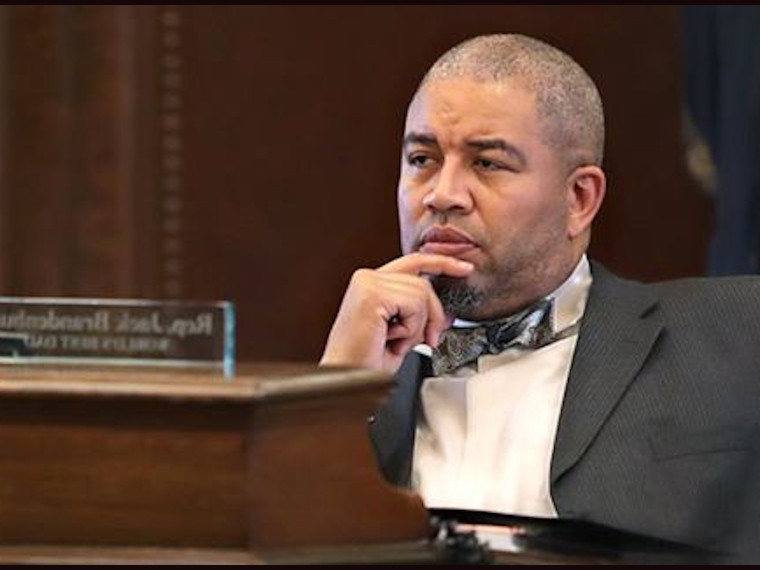Photo: Col. Joe Gasper, director of the Michigan State Police (MSP)
On June 3, Governor Gretchen Whitmer announced her support for a series of policy plans for police reform in Michigan, calling on Michigan law enforcement agencies to enhance their training and policies to help create a police culture where all Michiganders are treated with dignity and respect under the law. Whitmer also voiced her support for measures that require law enforcement officers to complete training on implicit bias and de-escalation techniques, and she applauded the Senate for taking up Senate Bill 945, sponsored by Sen. Jeff Irwin, which addresses many of these issues. In addition, the governor urged police agencies to require their officers to intervene when they observe an excessive use of force by another officer, which will save lives and help to keep people safe.
“The deaths of George Floyd, Ahmaud Arbery, and Breonna Taylor were a result of hundreds of years of inequity and institutional racism against Black Americans,” Whitmer said. “Here in Michigan, we are taking action and working together to address the inequities Black Michiganders face every day. That’s why I’m calling on Michigan police departments to strengthen their training and policies to save lives and keep people safe. I am also ready to partner with the Michigan legislature and law enforcement officials to pass police reform bills into law.”
Actions the governor is taking include:
- Requesting that the Michigan Commission of Law Enforcement Standards (MCOLES) provide guidance to law enforcement agencies on continuing education that will help officers keep up with the ever-changing landscape of new laws and issues facing the community, including diversity and implicit bias training.
- Encouraging police departments to participate in efforts that are underway on comprehensive reporting on the use of force by police departments.
- Urging law enforcement agencies to implement duty to intervene polices.
- The governor applauded Southfield Police Chief Elvin Barren and Lansing Police Chief Daryl Green for their efforts in ensuring their officers intervene when an officer observes another officer doing something inappropriate or illegal.
- Calling on the legislature to act on SB 945.
- Under Senator Irwin’s bill, SB 945, incoming law enforcement officers would be required by law to go through training on implicit bias, de-escalation techniques and mental health screenings.
“We recognize the shortcomings of the systems in place today—systems that have left Black, Latino, and other communities of color feeling underserved, even threatened by law enforcement,” said Lt. Governor Garlin Gilchrist.
“People across Michigan have been calling for changes to police practices, and these actions are clear steps in the direction of needed reform,” Gilchrist added. “We are not done, and we strongly encourage cities and counties to adopt and enact local measures that build trust, accountability and a comprehensive, non-discriminatory experience of safety for everyone in our state.”
Under the leadership of Governor Whitmer and Col. Joe Gasper, director of the Michigan State Police (MSP), has already taken a number of actions to reform policies that will ensure MSP members treat all Michiganders with dignity and respect.
“The role and responsibility of police officers in our society is a great one; one in which our authority is derived from the trust and support of the people we serve,” Gasper said. “Our members take an oath to protect and serve all people, and in this time, we cannot stand on the outside looking in. We must listen and take action, reviewing our policies and practices to work together to pave a path forward where everyone has a voice and all are treated equally as human beings.”
ACTIONS MSP HAS TAKEN:
- Created an Equity and Inclusion Officer position within the department.
- Set a goal to increase the racial minority trooper applicant pool to 25% and the female trooper applicant pool to 20%, in an effort to diversify the department.
- Established community service trooper positions to institute a community policing concept statewide.
- Posted all non-confidential department policies online to increase transparency.
- Implemented recurring implicit bias training for all enforcement members and assisted in the development and pilot of a nationwide implicit bias training for civilian personnel.
- Generated a public-facing transparency web portal for FOIA requests.
- Revised the department’s pursuit policy to limit the circumstances in which MSP members can engage in a vehicle pursuit.
“We look forward to partnering with Gov. Whitmer and Lt. Gov. Gilchrist to reform the systemic racial inequities in this country,” said Michigan Legislative Black Caucus Chair and Senator Marshall Bullock (D-Detroit).
“This is a time for rational thought and actions, exemplified by those using their voices and feet to march for justice and we look forward to working with leaders in the legislature to address these critical issues,” Bullock added. “Silence is no longer an option”


